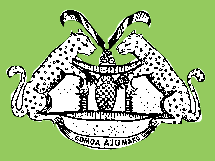TRADITIONAL PRACTICES
Traditional Practices Impacting on Biodiversity Conservation
 |
Land fallow is used by traditional farmers to ensure the maintenance
and conservation of soil fertility
¨ The emphasis in traditional African farming is risk minimisation
thus the cultivators stress is on food diversity and security as against
high productivity in their resource management.
¨ To ensure the continuity of some plant life forms, farmers do not
take home a whole bunch of palm fruits from the farm. One is expected
to cut a bit of the freshly harvested palm fruit and leave the nuts in
the forest before returning home because the palm fruit that is brought
home will be cooked and the kernels will not be able to germinate (Opoku,
1993, Abayie-Boaten 1997, Pers. Com.).
· In Ghana, the people of Elmina in the Central Region observe
the "bakatue" (lit. opening of the lagoon) ritual. The lagoons
are closed by traditional methods and fishing in them is completely banned
for a certain period of time within the year. Fishing is only allowed
after the lagoons are opened and the ban lifted. The lifting of the ban
culminates in the "bakatue" festival. Scientific research has
proved that the period for the closure of the lagoon and the ban on fishing
coincides exactly with the period that a lot of fish species spawn in
the lagoons. This ban therefore ensures that the reproduction of these
fish species is not affected adversely.
· In Ghana yet again, fishermen observe the ritual of sacrificing some of their catch to "Bosompo" (the sea god) after each fishing expedition before returning home. The fish that is sacrificed must be live and not dead ones. The Akan maxim which supports this ritual says: "Bosompo ankame wo nam a wo nso wonkame no abia" (If the god of the sea does not begrudge you of his fish, you do not begrudge him of your catch). The fish which fishermen sacrifice to "Bosompo" will continue to breed and there will continue to be fish in the ocean, not only for this present generation but also for succeeding generations, if this ritual is observed. The concern for the environment expressed in the ritual sacrifice of fish in this way is quite evident (Opoku, 1993).
· The classification of animals by the Akans of Ghana also reflects respect/fear for certain category of animals called "Sasa mmoa" (animals with revengeful spirits). This category is differentiated from the other animals that do not have revengeful spirits and are regarded as ordinary animals, "mmoa". When animals with revengeful spirits are killed special rituals have to be performed to make atonement for the act of destruction and also to protect the hunter or the killer of the animal from the danger from the spirit of the animal (Opoku, 1993).
Animals that fall under the category of "Sasa mmoa" are Otwe
(Maxwell's Duiker), Cephalophus guevei; Adowa (Royal Antelope), Neotragus
pygmaeus; Ofosuo (Waterbuck), Kobus defassa; Otrommo (Bongo), Boocercus
euryceros; Esono (Elephant), Loxodonta africana; Okwaduo (Yellow-backed
Duiker), Cephalophus sylvicultrix; Ewi (Black Duiker), Cephalophus niger;
and Okoo (Roan Antelope), Hippotragus equinus gambianus.